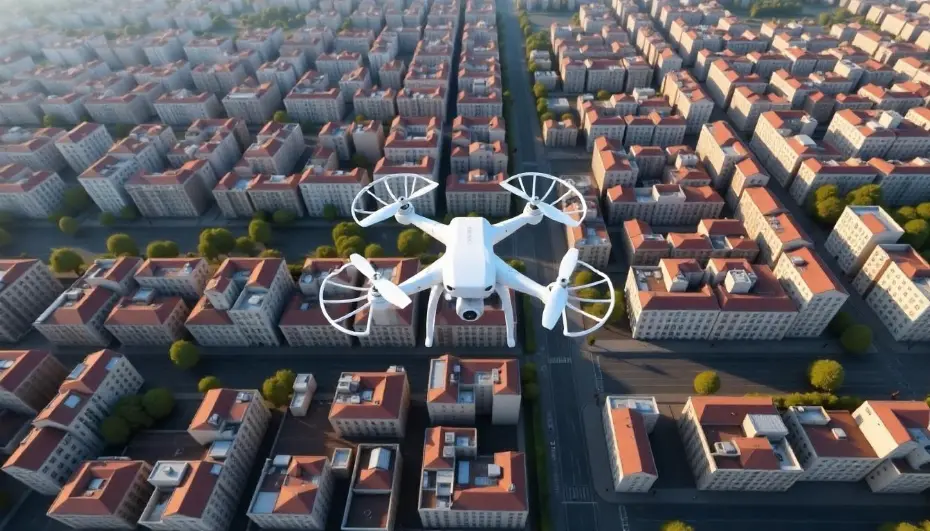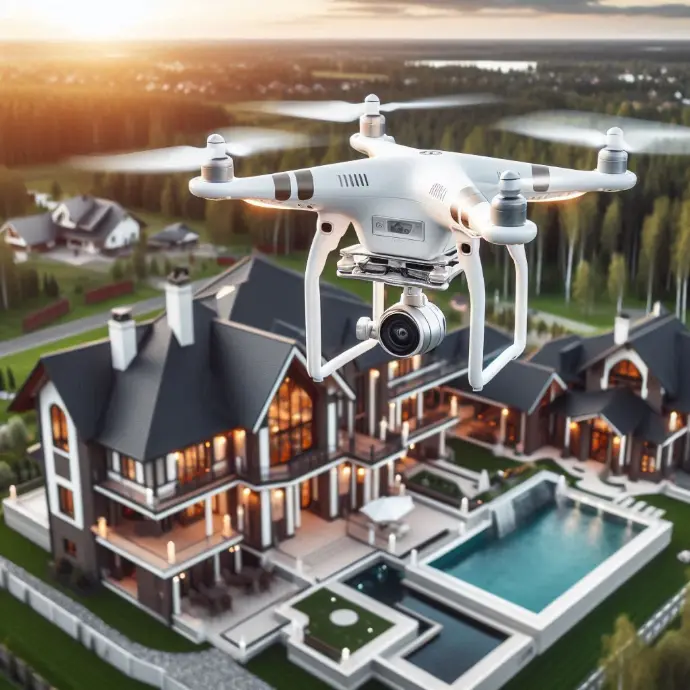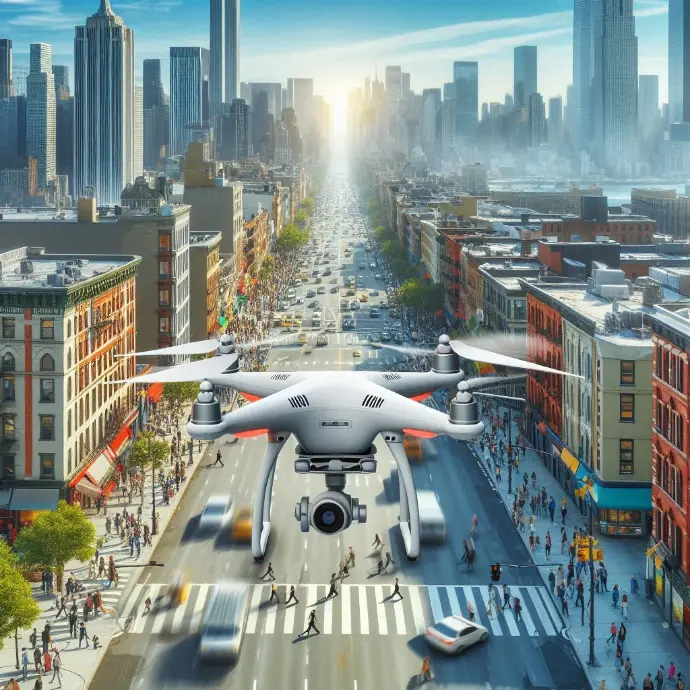Drones and Privacy: How Unmanned Aerial Vehicles Can Compromise Your Data
Here, you'll discover the fascinating world of emerging technologies and their impact on our daily lives. In our feature article, "Privacy Risks with Drones," we'll explore how Unmanned Aerial Vehicles can compromise your data, revealing the challenges we face in the age of cybersecurity. Ready to delve into this intriguing topic? Read on and discover how to protect your privacy in an increasingly technological world!
Discover more things Back to page

Introduction
Drones, also known as Unmanned Aerial Vehicles (UAVs), are remotely controlled aircraft that can be used for a wide range of purposes, from aerial photography to surveillance and package delivery. These aircraft can range in size from small models that can fit in the palm of the hand to larger drones used in industrial and military applications.
Drones are equipped with different technologies, such as cameras, sensors, and global positioning systems, allowing them to fly autonomously or be controlled by a remote pilot. Their versatility and ease of use have led to a significant increase in their popularity and applications in various industries.
In the area of privacy, drones pose particular challenges, as their ability to collect data and images from the air can have significant implications for the protection of personal data and individual privacy.
Drones have had a significant impact on today's society, with applications ranging from precision agriculture to critical infrastructure surveillance. In agriculture, drones are used to monitor crops, detect plant diseases, and optimize pesticide use. In the security field, drones are used to patrol hard-to-reach areas, providing authorities with an effective surveillance tool.
Furthermore, drones have revolutionized the entertainment and photography industries, allowing aerial images and videos to be captured in a manner previously inaccessible. However, this easy access to aerial image capture poses privacy challenges, as it can compromise people's privacy and violate data protection regulations in certain situations.
In the context of package delivery, companies such as Amazon and UPS have explored the use of drones to expedite the distribution of goods, which poses additional security and privacy challenges in urban airspace.
The use of drones raises significant legal and ethical considerations regarding individual privacy and data protection. In many countries, the use of drones is subject to strict regulations that seek to protect individual privacy and prevent the misuse of information collected by these devices.
On the ethical front, the use of drones for surveillance and data collection raises questions about the balance between public safety and individual privacy. Organizations and individuals employing drones must carefully consider how they collect, store, and use information obtained through these devices, ensuring compliance with data protection laws and respecting fundamental privacy rights.
While drones offer significant benefits in a variety of fields, it is critical to proactively address the legal and ethical implications associated with their use, particularly regarding the protection of privacy and personal data.

Privacy Risks with Drones
Drones, also known as Unmanned Aerial Vehicles (UAVs), have revolutionized numerous industries, from photography to logistics. However, their proliferation has raised significant concerns regarding privacy and data protection. As these devices become more accessible and advanced, it is crucial to understand the risks they pose to people's privacy.
One of the main risks associated with drones is the violation of privacy in public spaces. These devices can be used to take photographs and videos of people without their consent, raising serious ethical and legal questions. Although regulations exist for the use of drones in public spaces, monitoring and enforcing these regulations can be difficult, raising concerns about the invasion of people's privacy in open spaces.
The use of drones for surveillance in public spaces raises questions about the right to privacy and the protection of personal data. Although regulations exist for the use of drones in public spaces, monitoring and enforcing these regulations can be difficult, raising concerns about the invasion of people's privacy in open spaces.
The proliferation of drones in parks, beaches, festivals, and other public spaces has sparked debates about the need to safeguard individuals' privacy in these areas. It is essential to address these concerns through clear regulations and effective mechanisms to ensure compliance and protect people's privacy rights.
Another significant risk associated with drones is unauthorized access to personal data. In business and residential settings, drones can be used to collect confidential information, such as images of properties, people's daily routines, and other sensitive data. This unauthorized data collection can lead to privacy breaches and raise concerns about the misuse of the collected information.
The unauthorized collection of personal data via drones poses significant challenges in terms of data protection and privacy. It is critical to establish clear protocols for the use of drones in sensitive settings and ensure that individuals' privacy rights are respected. Furthermore, data encryption and restricted access to collected information can help mitigate the risks associated with unauthorized access to personal data.
The proliferation of drones in residential and commercial settings has raised concerns about the protection of privacy and the security of personal data. Establishing clear guidelines for the responsible use of drones and the protection of collected information is essential to safeguarding people's privacy and preventing potential breaches of sensitive data.
Drones pose potential privacy breach scenarios in a variety of contexts, from unauthorized surveillance to improper access to personal data. These devices can be used to obtain sensitive information, conduct unwanted tracking, and compromise people's privacy in a variety of settings.
It is crucial to assess the potential privacy breach scenarios associated with drone use and develop strategies to prevent and address these risks. Implementing privacy detection and protection technologies, as well as raising awareness about the ethical and legal implications of drone use, are critical steps to mitigate risks and ensure privacy protection in a world increasingly influenced by technology.
Identifying potential privacy breach scenarios involving drones is a crucial step in developing effective data protection and privacy strategies. By understanding the potential threats associated with drone use, proactive measures can be implemented to safeguard individual privacy and ensure an appropriate balance between technological innovation and personal data protection.
Currently, regulations on drone use and privacy vary significantly from country to country. In general, most countries have established regulations to govern the use of drones to protect individual privacy. These regulations typically address aspects such as maximum flight altitude, the minimum distance drones must be kept from private property, the need to obtain special permits for certain operations, and the obligation to respect the privacy of others.
In the United States, the Federal Aviation Administration (FAA) has established clear regulations for the use of drones to protect privacy and security. For example, flying drones over people not involved in the operation of the aircraft is prohibited unless they have special permission. Similarly, the European Union has implemented regulations through the European Aviation Safety Agency (EASA) to ensure privacy and security when using drones in public and private spaces.
In other countries, regulations also address the need to obtain consent for the capture of images and personal data by drones, as well as prohibiting filming in certain sensitive areas, such as residential areas or government facilities. As drone technology continues to evolve, current regulations are likely to be modified to address new challenges and privacy risks, underscoring the importance of staying up-to-date on local regulations when using this technology.
Consequences of Privacy Violations
The widespread use of drones raises significant concerns regarding individual privacy. These devices have the ability to collect data and images of private areas, which can invade individuals' privacy. From unauthorized surveillance to capturing compromising images, drones pose a potential threat to individuals' privacy in their homes, gardens, and other private spaces.
Furthermore, the possibility of drones collecting personal data, such as geolocation, without individuals' consent raises important questions about personal data protection and the vulnerability of privacy in the era of drone technology.
The combination of drones' flight capabilities with their advanced camera and sensor technology can result in a significant invasion of individual privacy, requiring careful consideration of the regulation and ethical use of these devices.
Drone owners also face several legal considerations regarding privacy. Capturing images or data on private property without authorization can result in lawsuits for privacy violations. In many countries, specific laws regulate the use of drones to protect individual privacy.
Furthermore, in a commercial context, companies that use drones to collect data must ensure they comply with data protection and privacy regulations, preventing the unauthorized collection and use of personal information. Failure to comply with these regulations can lead to significant fines and damage the company's reputation.
In this regard, drone owners, whether individuals or businesses, must be aware of the legal implications of their use and take the necessary measures to protect individual privacy and comply with applicable regulations.
The impact on privacy resulting from the improper use of drones can undermine trust in this emerging technology. If drones are perceived as a threat to privacy and data security, this is likely to generate distrust in both their commercial and government applications. This lack of trust could hamper the development and widespread adoption of drones, limiting their potential benefits in areas such as surveillance, package delivery, and exploration of remote terrain.
Therefore, it is crucial to effectively address privacy concerns related to drones by establishing clear regulations, promoting ethical practices, and fostering transparency in the use of these devices to mitigate potential impacts on trust in this innovative technology.

Data Protection and Privacy in the Use of Drones
Technological advances have led to the development of drones, unmanned aerial vehicles, which have diverse applications in fields such as agriculture, security, photography, and entertainment. However, the use of drones poses challenges in terms of privacy and data protection, as they can collect sensitive information from individuals without their consent. It is essential to be aware of personal data protection measures to ensure that the use of drones does not compromise individuals' privacy.
Personal Data Protection Measures
To protect people's privacy, it is crucial to implement specific measures when using drones. This includes compliance with local laws and regulations related to data protection, as well as encrypting information collected by drones to prevent unauthorized access. Furthermore, it is important to limit data collection to only what is strictly necessary for the intended purpose and ensure transparency in the use of drones, informing people about the collection and processing of their data. Organizations and individuals using drones must establish clear privacy and data protection policies and train staff in the safe handling of the information collected. Raising awareness about the importance of personal data protection is essential to ensure the ethical and responsible use of drones.
When purchasing a drone, it is crucial to consider the privacy and data protection implications. It is essential to research the drone's privacy features, such as the ability to disconnect the camera or disable data transmission to third parties. It is also important to review the manufacturer's privacy policies to understand how the data collected by the drone will be handled.
Furthermore, it is advisable to choose drones manufactured by companies that prioritize privacy and data protection and that offer guarantees regarding the secure handling of the collected information. Considering privacy aspects when purchasing a drone is essential to avoid potential risks to people's privacy.
To ensure privacy when using drones, it is essential to follow certain practical recommendations. These include limiting the collection of personal data to the minimum necessary, avoiding the capture of information that is unnecessary or irrelevant to the intended purpose. Furthermore, it is important to ensure that the collected information is stored securely and deleted when no longer needed, thus reducing the risk of unauthorized access.
It is also recommended that people be informed about the presence and purpose of the drone when used in public areas, and that consent be obtained when necessary. Ethical and responsible use of drones is essential to preserve people's privacy and avoid potential legal or ethical conflicts.
Conclusions
The advancement of drone technology has revolutionized numerous industries, from precision agriculture to filmmaking. However, this progress has also posed significant challenges regarding privacy protection. As drones become more accessible and versatile, it is critical to strike a balance between the innovative use of this technology and the safeguarding of the personal data of individuals and communities.
Legal regulations and guidelines play a crucial role in this balance. It is imperative that governments and regulators develop clear regulatory frameworks that address the collection, storage, and use of data collected by drones. Similarly, drone manufacturers and operators must be responsible in their approach to privacy, integrating security and data protection measures into the design and operation of their devices.
Furthermore, public awareness and education play an essential role in protecting privacy in the context of drones. Fostering an understanding of the privacy implications and promoting the ethical use of drones can significantly contribute to mitigating the risks associated with the unauthorized exposure of personal information.
Ultimately, responsible drone adoption involves a careful assessment of the benefits and risks associated with their implementation. While these technologies offer exciting opportunities in diverse fields, from delivering medical supplies in remote areas to monitoring natural disasters, it is essential to consider and address potential impacts on privacy and data protection.
Transparency in the use of drones, informed consent, and minimizing data collection are fundamental principles that should guide the integration of drones into society. By taking a proactive approach to privacy protection, both at the regulatory and individual levels, we can harness the potential of drones in an ethical and sustainable manner, ensuring that technological advancements do not compromise people's privacy and security.
The use of drones must be accompanied by an unwavering commitment to protecting privacy, ensuring that these innovative devices enhance our lives without unduly infringing on our fundamental rights.

 IHRO NEWS
IHRO NEWS